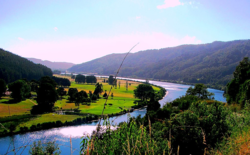Calle-Calle River, also called Gudalafquén in Mapuche language, is a river in Valdivia Province, southern Chile. It drains waters from the San Pedro River to the Valdivia River, which in turn flows into Corral Bay on the Pacific Ocean.
| Calle-Calle River Gudalafquén (Mapudungun) | |
|---|---|
 View of Calle-Calle River a few kilometers upstream from Valdivia | |
 | |
| Native name | Río Calle-Calle (Spanish) |
| Location | |
| Country | Chile |
| Physical characteristics | |
| Source | |
| • location | San Pedro River |
| Mouth | |
• location | Valdivia River |
| Length | 55 km (34 mi)[1] |
The river's name derives from the Mapuche word for the flower Libertia chilensis.[2]
The Calle-Calle is among the few rivers in Chile that are considered navigable. The Calle-Calle and Santa Elvira bridges crosses the river in the city of Valdivia.
The city of Valdivia obtains most of its water supply from Calle-Calle River near Cuesta Soto. Decreasing precipitation has caused the river to be contaminated with saline water from the coast.[3] The effects of saline water entering the water supply of Valdivia were particularly noticeable in 2015 when there was a surge in complains about the taste of the water.[3][4] The saltwater in the rivers near Valdivia during autumn is expected to increase in the future.[4] Estimations indicate that whenever the sum of the water discharge of Cruces and Calle-Calle rivers falls below 74 m3/s (2,600 cu ft/s) saltwater reaches the supply site at Cuesta Soto.[4]

References
edit- ^ "Cuenca del río Valdivia" (PDF). Archived from the original (PDF) on 2007-09-27. Retrieved 2007-10-28.
- ^ "Historia". Museo de Sitio Castillo de Niebla (in Spanish). Servicio Nacional del Patrimonio Cultural. Archived from the original on 2020-08-04. Retrieved 2021-04-01.
- ^ a b Jara, Yonatan; Stuardo, Manuel (2020-09-21). "Científicos proyectan en 80 años la llegada de mar a toma de agua en Valdivia para buscar soluciones". Radio Bío-Bío (in Spanish). Retrieved 2022-03-07.
- ^ a b c Lara, Emilio (2020-09-16). "El mar se acerca a principal toma de agua dulce en Valdivia y amenaza calidad del recurso". Radio Bío-Bío (in Spanish). Retrieved 2022-03-07.